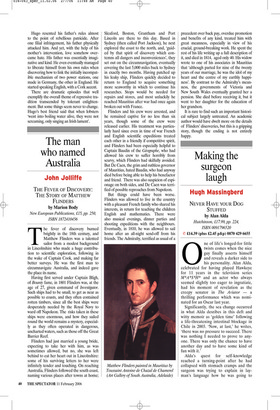The man who named Australia
John Jolliffe
THE FEVER OF DISCOVERY: THE STORY OF MATTHEW FLINDERS by Marion Body New European Publications, £15, pp. 250, ISBN 1872410456 The fever of discovery burned brightly in the 18th century, and Matthew Flinders was a talented sailor from a modest background in Lincolnshire who made a huge contribution to scientific exploration, following in the wake of Captain Cook, and making far better surveys. He was the first man to circumnavigate Australia, and indeed gave the place its name.
Having first served under Captain Bligh, of Bounty fame, in 1801 Flinders was, at the age of 27, given command of Investigator. Such ships had to be small, to get as near as possible to coasts, and they often contained rotten timbers, since all the best ships were desperately needed by the Royal Navy to ward off Napoleon. The risks taken in these ships were enormous, and how they sailed round the world remains a mystery, especially as they often operated in dangerous, uncharted waters, such as those off the Great Barrier Reef.
Flinders had just married a young bride, expecting to take her with him, as was sometimes allowed, but no, she was left behind to eat her heart out in Lincolnshire: some of his surviving letters to her were infinitely tender and touching. On reaching Australia, Flinders followed the south coast, naming various places after towns at home; Sleaford, Boston, Grantham and Port Lincoln are there to this day. Based in Sydney (then called Port Jackson), he next explored the coast to the north, and, ‘guided by that spirit of discovery which contemns all dangers and inconveniences’, they set out on the circumnavigation, eventually covering the last 5,000 miles back to Sydney in exactly two months. Having patched up his leaky ship, Flinders quickly decided to return to England to acquire something more seaworthy in which to continue his researches. Stops would be needed for repairs and stores, and most unluckily he reached Mauritius after war had once again broken out with France.
Flinders and his crew were arrested, and he remained captive for no less than six years, though some of the crew were released earlier. His treatment was particularly hard since even in time of war French and English scientific expeditions treated each other in a friendly if competitive spirit, and Flinders had been especially helpful to Captain Baudin of the Géographe, who had allowed his crew to suffer horribly from scurvy, which Flinders had skilfully avoided. But De Caen, the grim and ruthless governor of Mauritius, hated Baudin, who had anyway died before being able to help his benefactor and friend. There was also suspicion of espionage on both sides, and De Caen was terrified of possible reproaches from Napoleon.
But things could have been worse. Flinders was allowed to live in the country with a pleasant French family who shared his interests, in return for teaching the children English and mathematics. There were also musical evenings, dinner parties and shooting expeditions with the neighbours. Eventually, in 1810, he was allowed to sail home after an all-night send-off from his friends. The Admiralty, terrified as usual of a precedent over back pay, overdue promotion and benefits of any kind, treated him with great meanness, especially in view of his crucial, ground-breaking work. He spent the rest of his life writing up a full description of it, and died in 1814, aged only 40. His widow wrote to one of his associates in Mauritius that ‘although parted for nine of the twenty years of our marriage, he was the idol of my heart and the centre of my earthly happiness’. By contrast to the Admiralty’s meanness, the governments of Victoria and New South Wales eventually granted her a pension. She died before receiving it, but it went to her daughter for the education of her grandson.
It is rare to find such an important historical subject largely untreated. An academic author would have dwelt more on the details of Flinders’ discoveries, but this is a gripping story, though the ending is not entirely happy.














































 Previous page
Previous page